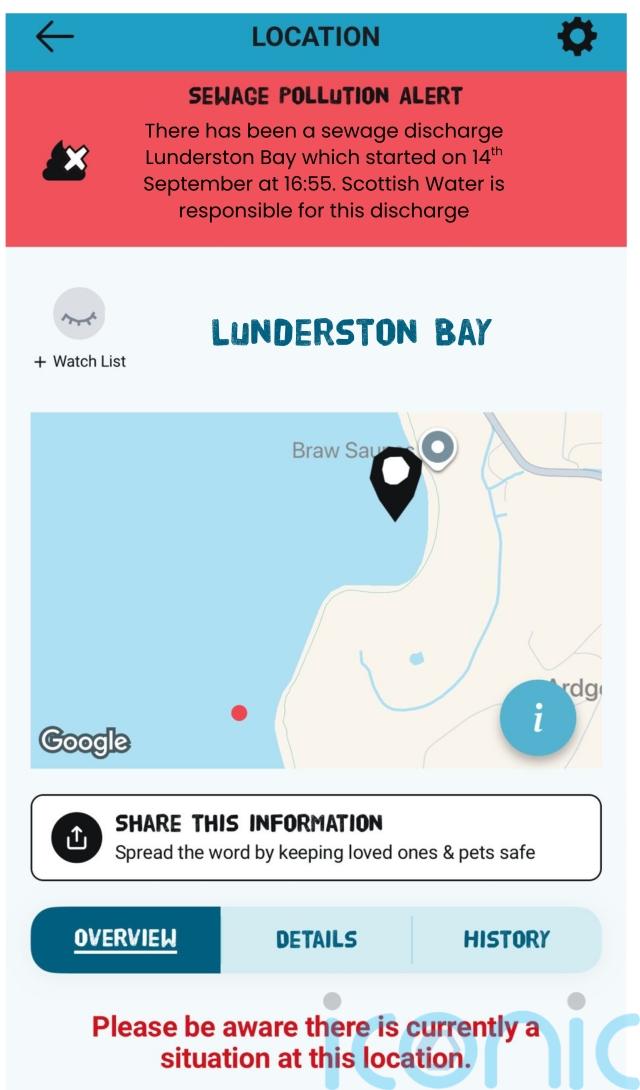
Swimmers and surfers have been “kept in the dark” for too long on sewage pollution, a charity has said as it launches an app that will provide real-time alerts whenever sewage is discharged into Scotland’s bathing waters.
Surfers Against Sewage (SAS), which launched the Safer Seas and Rivers Service (SSRS) app on Tuesday, said it will provide people with “at least some form of protection from the risks of sewage pollution”.
The alert triggers whenever sewage is discharged from an overflow within 2km (1.2 miles) of a designated bathing site.
Of the 89 bathing waters in Scotland, SAS said 48 have a combined sewer overflow (CSO) within 2km.
Although the alert will not confirm whether it is safe to swim, SAS said it believes in sharing the best available information as part of its campaign for cleaner bathing waters.
The charity said the app is necessary because Scottish Water has “never provided live sewage alerts”.
It said although the publicly owned company released “limited data” on discharges in 2024, gaps and inconsistencies remain that prevent the creation of a comprehensive public alert system in Scotland.
Annie McKelvey, senior data officer at SAS, said: “For too long, surfers and swimmers in Scotland have been kept in the dark about sewage pollution.
“With no legal requirement for alerts, Scottish Water has dragged its feet, leaving people exposed and without the warnings they need to stay safe.
“Scotland’s waters are not as clean as people think, and people are getting sick from sewage.
“That is why we are using the data we can get to expose sewage dumping and issue real-time alerts through the SSRS app for water users in Scotland.

“It is not a perfect system, but in the face of inaction from Scottish Water and the government, the public deserves at least some form of protection from the risks of sewage pollution.”
The Scottish Environment Protection Agency monitors water quality at designated bathing sites, and this year issued 545 pollution risk warnings at Scotland’s beaches.
However the charity pointed out it only does so during the bathing season (May 15-September 15), whereas the app provides year-round pollution alerts for the 48 bathing sites within 2km of a CSO.
The app also enables users to contact their MSP directly whenever a sewage alert is triggered, which SAS said will “turn alerts into direct political action”.
The charity added: “We are calling on Scottish Water, and all UK water companies, to step up with gold-standard monitoring and alerts to protect people’s health.”
Shelley Sim, who was admitted to hospital with cryptosporidiosis after swimming at a beach in Dunbar, said swimmers wanted to know “what danger we are putting ourselves in, all year round, not just in the bathing season”.
She continued: “We find with our own little swimming group that more people are swimming through the winter than in the summer, and swimming as much as possible through the colder months.
“We need to know the data, so that we know whether or not it is safe to swim.”
In response Scottish Water said it already provides “near real-time data” on sewage overflows, which it said are necessary to protect homes and businesses from sewer flooding during heavy rain.
It added that spills from overflows are not the only potential source of bacteria in the environment, and that waste from animals such as gulls, seals and dogs, and run-off from farming, can also lead to people falling ill.
A spokesperson for the company said: “We are monitoring more overflows than ever before, providing more information on overflows than ever before and investing more than ever before in our waste water network.
“Scotland’s water quality is at its highest ever and we remain committed to targeting resources and investment to preserve and protect Scotland’s water environment.”
A Scottish Government spokesperson said: “Ninety-seven per cent of Scotland’s bathing waters currently achieve the bathing water quality standards, with 85% being rated ‘good’ or ‘excellent’.
“We take poor water quality reports very seriously.
“Scottish Water is committing up to £500 million of investment to increase monitoring and reporting of overflows, reduce overflows, improve water quality and reduce sewer-related debris in the environment, and overflows that are found to operate incorrectly or impact on water quality are prioritised for investment.”
Subscribe or register today to discover more from DonegalLive.ie
Buy the e-paper of the Donegal Democrat, Donegal People's Press, Donegal Post and Inish Times here for instant access to Donegal's premier news titles.
Keep up with the latest news from Donegal with our daily newsletter featuring the most important stories of the day delivered to your inbox every evening at 5pm.